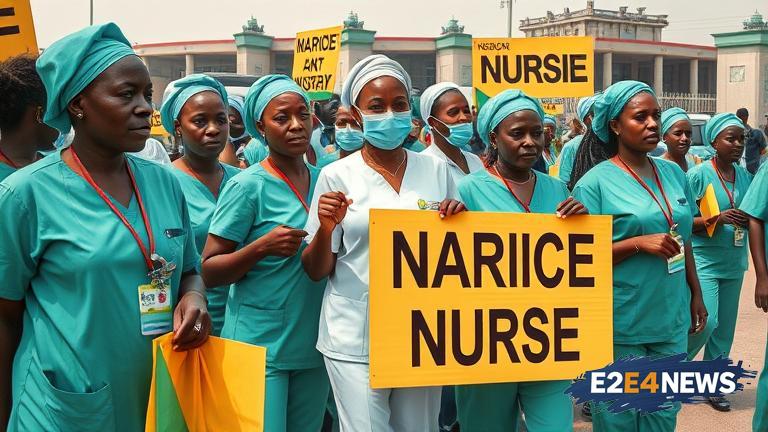The Nigerian nurses’ strike, which commenced on July 31, 2025, is a result of the breakdown in negotiations between the nurses’ union and the government. The nurses are demanding improved wages and better working conditions, including adequate staffing levels. The strike has been called by the National Association of Nigerian Nurses and Midwives (NANNM), which represents over 100,000 nurses across the country. According to the NANNM, the government has failed to address the pressing issues affecting the nursing profession, despite numerous meetings and agreements. The nurses are seeking a 50% increase in their salaries, as well as the employment of more nurses to reduce the workload and improve patient care. The strike has already started to take its toll on the healthcare system, with many hospitals and clinics struggling to cope with the reduced staff. Patients are being forced to seek alternative care, and there are concerns about the impact on emergency services. The government has urged the nurses to return to work, citing the potential harm to patients and the economy. However, the NANNM has stated that it will not back down until its demands are met. The strike is the latest in a series of industrial actions by healthcare workers in Nigeria, who are frustrated with the poor working conditions and low pay. The Nigerian Medical Association (NMA) has expressed solidarity with the striking nurses, stating that the government must take urgent action to address the issues affecting the healthcare sector. The strike has also sparked concerns about the brain drain of Nigerian healthcare professionals, who are seeking better opportunities abroad. Many nurses have already left the country in search of better pay and working conditions, and the strike is likely to exacerbate this trend. The government has been criticized for its handling of the crisis, with many accusing it of being slow to respond to the nurses’ demands. The strike is a major challenge for the government, which is already facing criticism for its handling of the economy and security. The Nigerian people are bearing the brunt of the strike, with many forced to seek alternative care or travel long distances to access healthcare services. The strike is also having a significant impact on the economy, with many businesses and industries affected by the reduced activity. The government has announced plans to deploy military personnel to hospitals to maintain order, but this has been met with criticism from the NANNM, which argues that it will not solve the underlying issues. The strike is a wake-up call for the government to take urgent action to address the issues affecting the healthcare sector, including the poor working conditions, low pay, and inadequate staffing levels. The Nigerian people are calling for a swift resolution to the crisis, and the government must take immediate action to address the nurses’ demands and prevent further disruption to the healthcare system. The strike is a major test for the government, which must balance the competing demands of the nurses, patients, and the economy. The outcome of the strike will have significant implications for the future of the healthcare sector in Nigeria, and the government must take a proactive approach to addressing the underlying issues. The NANNM has vowed to continue the strike until its demands are met, and the government must take urgent action to prevent further disruption to the healthcare system.
